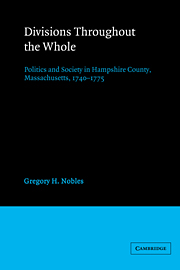Book contents
- Frontmatter
- Contents
- Preface
- Introduction
- 1 Family power and political relations in Hampshire County
- 2 The Hampshire County ministry and the Great Awakening: from revival to reaction
- 3 The revivalist removed
- 4 The legacy of religious dissent
- 5 New settlements in an unsettled society
- 6 The politics of parochialism
- 7 Revolution in the neighborhood
- Appendix
- Notes
- Bibliographical essay
- Index
- Frontmatter
- Contents
- Preface
- Introduction
- 1 Family power and political relations in Hampshire County
- 2 The Hampshire County ministry and the Great Awakening: from revival to reaction
- 3 The revivalist removed
- 4 The legacy of religious dissent
- 5 New settlements in an unsettled society
- 6 The politics of parochialism
- 7 Revolution in the neighborhood
- Appendix
- Notes
- Bibliographical essay
- Index
Summary
In March of 1774 the people of Amherst, Massachusetts, finally got around to drafting a letter to the Boston Committee of Correspondence. Having ignored the earlier appeals of the urban radicals, the inhabitants of this western town admitted that they had been “Long silent” on the issues surrounding the growing political crisis in the east. Still, they declared that they were “not insensible of the oppression we suffer and the ruin which threatens us or … of the Diabolical Designs of our Mercenary and Malevolent Enemies Foreign and Domestic and we are ready not onley to risque but even to Sacrifice our Lives and Properties in Defence of our just rights & liberties.” It was a message the Boston Committee of Correspondence could well appreciate. Not only did the Amherst people sprinkle throughout their letter bits of good Whig language about the “Diabolical Designs,” “Tironey and Oppression falsehood & Corruption,” and “malicious cunning” of “those villens in Exalted Station” in England; they also made a point of thanking “the vigilant and faithfull gardians of our rights” in Boston. In short, the people of Amherst seemed to do just what the Boston Whigs wanted them to do: deny the legitimacy of a corrupted British government, accept the leadership of the Boston Committee, and commit themselves to a growing national movement that would soon reject the authority of the Crown altogether.
- Type
- Chapter
- Information
- Divisions throughout the WholePolitics and Society in Hampshire County, Massachusetts, 1740–1775, pp. 1 - 11Publisher: Cambridge University PressPrint publication year: 1983

